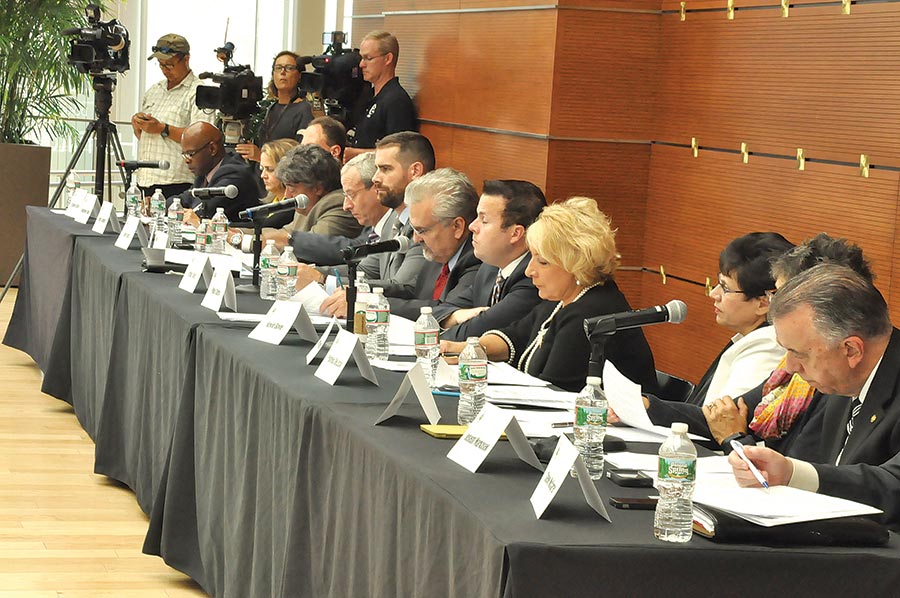Pennsylvania Rep. Brian Sims gathered many of his colleagues from the House Democratic Policy Committee last week to listen to testimony on hate crimes, in the wake of last month’s gay-bashing in Center City.
The committee met at the Kimmel Center Oct. 2 and heard from many prominent members of the local LGBT community.
Among the committee members in attendance were Reps. Mike Sturla (D-96th Dist.), Mary Jo Daley (148th Dist.), Joseph Markosek (25th Dist.), Pamela DeLissio (194th Dist.), Kevin Boyle (172nd Dist.), Dan Frankel (23rd Dist.), Dom Costa (21st Dist.), Mark Longietti (Seventh Dist.), Madeleine Dean (153rd Dist.), Stephen Kinsey (201st Dist.), Ronald Waters (191st Dist.) and Maria Donatucci (185th Dist.).
The committee heard testimony from four panels.
Maureen Rush, vice president for public safety and superintendent of the University of Pennsylvania Police Department and Elicia Gonzales, executive director of GALAEI: A Queer Latin@ Social Justice Organization, spoke first.
Rush shared statistics that revealed how significant an issue sexual orientation-based hate crimes is across the country.
“In 2012, the FBI cited 1,135 hate crimes in which the perpetrators’ bias motivation was sexual orientation. This bias motivation is second only to race,” Rush said.
As a member of the curriculum development group for police-officer training across the state in the 1990s, Rush stressed the deterring effect hate-crimes legislation has.
“Perpetrators know that society cares about protecting people who are the object of other people’s hatred because of their race, color, religion, gender, etc. All of these are things people can’t change or don’t wish to change. Would-be offenders become aware through the media and the courts that when you attack people in any of these categories, you will receive a greater sentence. It tells hate-filled criminals that such actions are not tolerated by our society,” Rush said.
The second panel was comprised of District Attorney Seth Williams and Nellie Fitzpatrick, assistant district attorney and the department’s LGBT liaison.
Williams reiterated how he was not able to charge the assailants in the recent gay-bashing incident with ethnic intimidation, but restoring hate-crimes law to include LGBT protections could empower prosecutors and send a message to potential offenders.
“Restoring sexual orientation and gender identity to the crime of ethnic intimidation would restore an important tool to all prosecutors across the commonwealth,” Williams said. “It would send the clear message that attacking someone for his or her sexual orientation is unacceptable and will be punished to the fullest extent of the law.”
The law was amended in 2002 to include sexual orientation, gender identity and disability but a suit from Repent America’s Michael Marcavage led to these classes being repealed on a technicality.
He also said the proposed legislation has support from prosecutors from all over the state.
“I am also pleased to report that restoring our ethnic-intimidation law to its pre-Marcavage status has the support of the Pennsylvania District Attorneys Association, of which I am the legislative chair.”
The committee also heard from Temple University law professor Leonore Carpenter, Philadelphia Commission on Human Relations chair Thomas Earle, community organization and consultant Sharron Cooks of Making Our Lives Easier LLC and Caryn Kunkle, friend and spokesperson of the victims of the recent gay-bashing.
The House bill that would amend the state hate-crimes law moved out of the house Judiciary Committee on Monday. It now awaits a vote on the House floor.
The Senate has yet to be scheduled for a committee vote.
Both legislatures are scheduled to be in session for only three more (non-consecutive) days.
